Scout24 Bundle
Who Really Owns Scout24?
The ownership structure of a company is a critical factor that dictates its strategic direction, governance, and overall influence in the market. Understanding who owns Scout24 SE, a leading digital company, is key to grasping its future trajectory. This knowledge is especially pertinent given pivotal events in Scout24's history, including its IPO and subsequent private equity involvement. This analysis unveils the key players shaping the future of Scout24 SWOT Analysis.
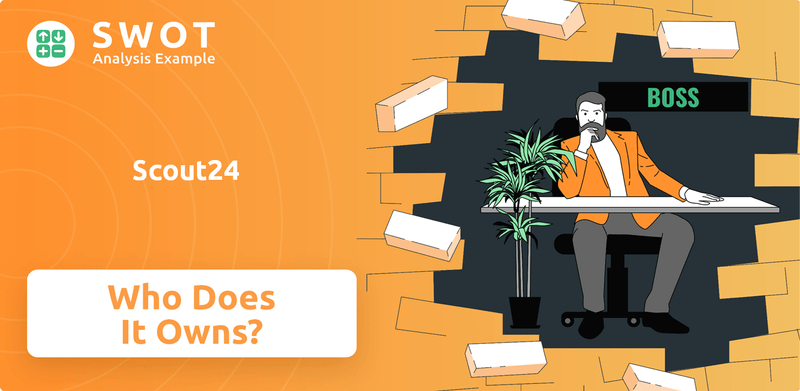
From its founding by Joachim Schoss in 1998 to its current status as a publicly-listed company, the evolution of Scout24's ownership provides valuable insights. This exploration will cover the company’s current market capitalization and trace its path from its founders and early backers to significant institutional investors and public shareholders. Discover the answers to "Who owns Scout24" and "Who are the shareholders of Scout24" to understand the dynamics of this German market leader, including its core business, ImmoScout24, and its listing in the MDAX.
Who Founded Scout24?
The story of Scout24's ownership begins in 1998. Internet entrepreneur Joachim Schoss established the company. Early backing came from entrepreneur Otto Beisheim and other initial investors.
While specific equity splits aren't publicly detailed for the founders at the start, the involvement of figures like Otto Beisheim highlights the importance of external funding in the company's early days. This external investment played a crucial role in laying the groundwork for what would become a major player in online classifieds.
In 2004, T-Online, a subsidiary of Deutsche Telekom, acquired Scout24 from Beisheim Holding, marking a significant shift in early ownership. By June 2006, following the merger of T-Online International with Deutsche Telekom, Scout24 became a direct subsidiary of Deutsche Telekom.
The acquisition by Deutsche Telekom was a strategic move to integrate online classifieds into a broader digital services portfolio. This transition solidified a corporate parent structure for several years, influencing the strategic direction and growth of the company.
- 1998: Joachim Schoss founds Scout24.
- 2004: T-Online acquires Scout24 from Beisheim Holding.
- 2006: Scout24 becomes a direct subsidiary of Deutsche Telekom.
Scout24 SWOT Analysis
- Complete SWOT Breakdown
- Fully Customizable
- Editable in Excel & Word
- Professional Formatting
- Investor-Ready Format
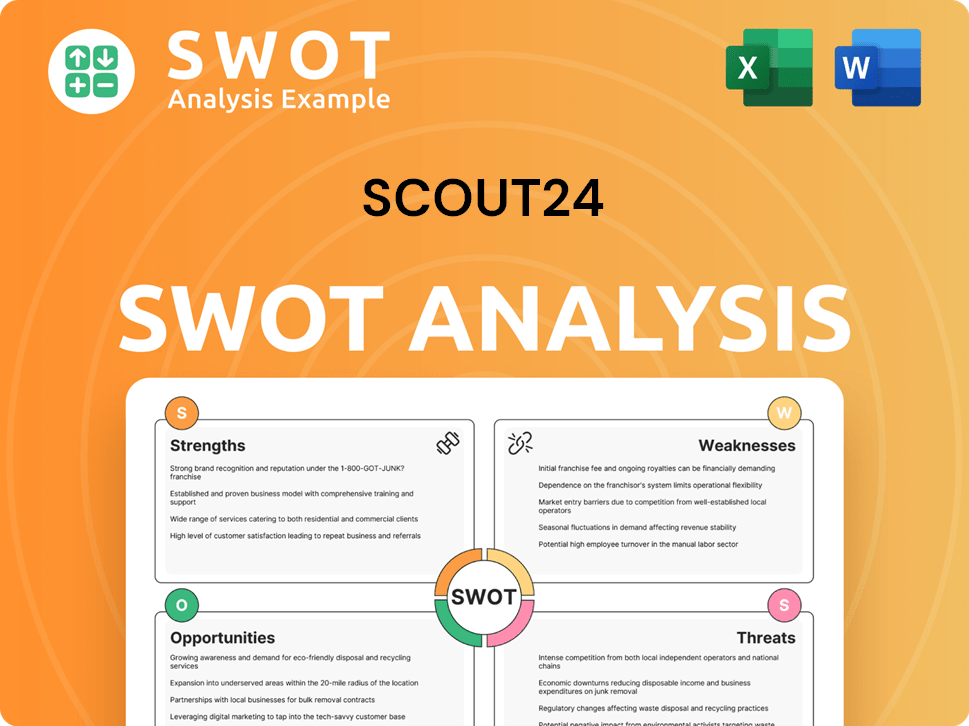
How Has Scout24’s Ownership Changed Over Time?
The journey of Scout24's ownership has seen several significant shifts. Initially, Deutsche Telekom held the reins but began selling its stake in mid-2013. Hellman & Friedman acquired a major share in November 2013, followed by Blackstone in February 2014. This set the stage for the company's initial public offering (IPO) in October 2015, which further diversified the ownership structure.
The IPO marked a pivotal moment, with Hellman & Friedman retaining a significant portion alongside Deutsche Telekom and the remaining shares in free float. However, Hellman & Friedman later divested its entire stake in September 2016. In 2019, a takeover bid by Blackstone and Hellman & Friedman was attempted but ultimately failed. These changes highlight the dynamic nature of Scout24 ownership and its evolution through various investment strategies.
| Date | Event | Stakeholders Involved |
|---|---|---|
| November 21, 2013 | Deutsche Telekom divests 70% of shares | Hellman & Friedman |
| February 2014 | Additional stake sold | Blackstone |
| October 1, 2015 | IPO on the Frankfurt Stock Exchange | Hellman & Friedman, Deutsche Telekom, Public |
As of May 2025, the Scout24 company has a diverse shareholder base. Institutional investors hold the largest portion at 65.9% (47,738,537 shares). The general public owns 22.9% (16,553,495 shares), while hedge funds hold 5.14% (3,722,222 shares). Insiders have a 3.06% stake (2,217,829 shares), and state or government entities hold 3% (2,168,833 shares). Private companies have a minimal 0.012% (8,716 shares). This distribution indicates a strong presence of institutional investors and a significant public float, reflecting the company's status as a publicly traded entity. The ownership structure showcases a balance between institutional and public investors, influencing the strategic direction and financial performance of Who owns Scout24 and its subsidiaries like Immobilienscout24 and AutoScout24.
The ownership of Scout24 AG has evolved significantly over time, marked by strategic acquisitions and an IPO.
- Institutional investors hold the majority of shares.
- The general public and hedge funds also have significant stakes.
- Insiders and government entities hold smaller portions of the shares.
- Private companies have a minimal share.
Scout24 PESTLE Analysis
- Covers All 6 PESTLE Categories
- No Research Needed – Save Hours of Work
- Built by Experts, Trusted by Consultants
- Instant Download, Ready to Use
- 100% Editable, Fully Customizable
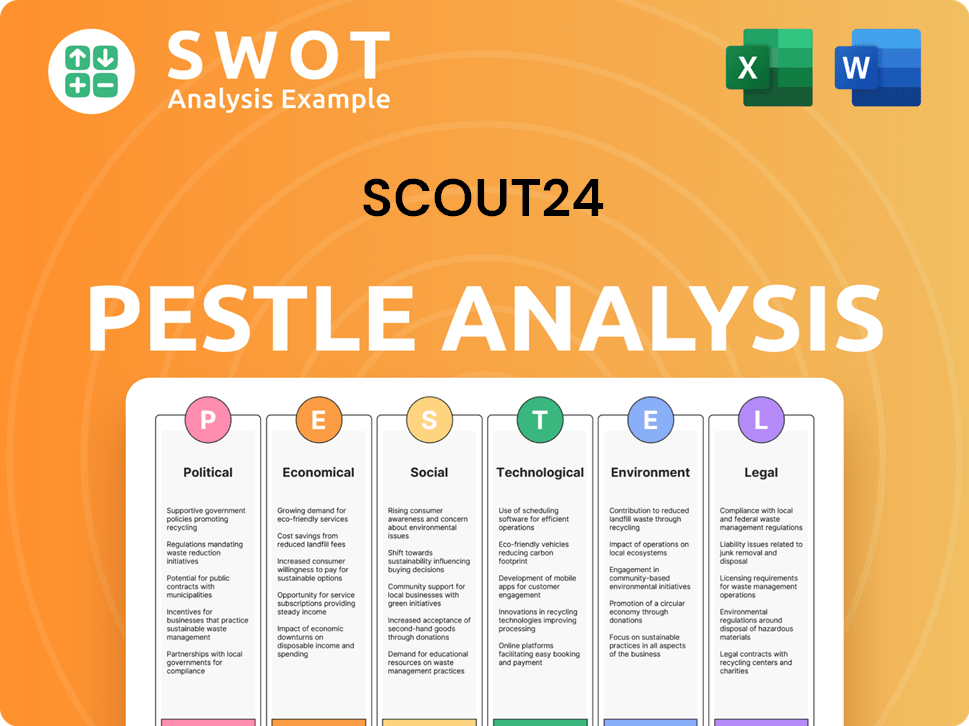
Who Sits on Scout24’s Board?
The current Supervisory Board of Scout24 SE, crucial for the company's governance, includes key figures. As of June 2025, Hans-Holger Albrecht holds the position of Chairman. Other members include Frank H. Lutz, André Schwämmlein, Elke Frank, Maya Miteva, and Sohaila Ouffata. Lutz Finger joined the Supervisory Board on June 5, 2025, replacing Sohaila Ouffata. These board members bring significant experience, with an average tenure of approximately 5.3 years, contributing to the strategic direction of the company.
The composition of the Supervisory Board reflects a commitment to experienced leadership, guiding the strategic direction of the company. The board's role is pivotal in overseeing the company's operations and ensuring alignment with shareholder interests. The Annual General Meeting on June 5, 2025, saw shareholders approving all proposed resolutions with a large majority, including a new compensation system for the Management Board members and the renewal of authorization to purchase treasury shares. The company’s integrated annual report for 2024, published on March 27, 2025, also highlighted strong financial performance and a proposed 10% dividend increase to EUR 1.32 per share.
| Board Member | Position | Tenure (Approx.) |
|---|---|---|
| Hans-Holger Albrecht | Chairman | N/A |
| Frank H. Lutz | Member | N/A |
| André Schwämmlein | Member | N/A |
| Elke Frank | Member | N/A |
| Maya Miteva | Member | N/A |
| Lutz Finger | Member | Joined June 5, 2025 |
The voting structure at Scout24 SE typically follows a one-share, one-vote principle, common among publicly listed German companies. There is no publicly available information suggesting the existence of dual-class shares or special voting rights that would concentrate control in specific hands. This structure ensures that all shareholders have voting power proportional to their share ownership, promoting equitable governance. If you're interested in the Brief History of Scout24, it provides more context.
Scout24's governance structure is designed to ensure fair representation and decision-making. The Supervisory Board plays a key role in overseeing the company's strategic direction. This structure supports the company's long-term goals and shareholder value.
- The Supervisory Board is responsible for overseeing the management.
- Shareholders have voting rights proportional to their share ownership.
- The company's financial performance is strong, with a dividend increase proposed.
- The board members have significant experience.
Scout24 Business Model Canvas
- Complete 9-Block Business Model Canvas
- Effortlessly Communicate Your Business Strategy
- Investor-Ready BMC Format
- 100% Editable and Customizable
- Clear and Structured Layout
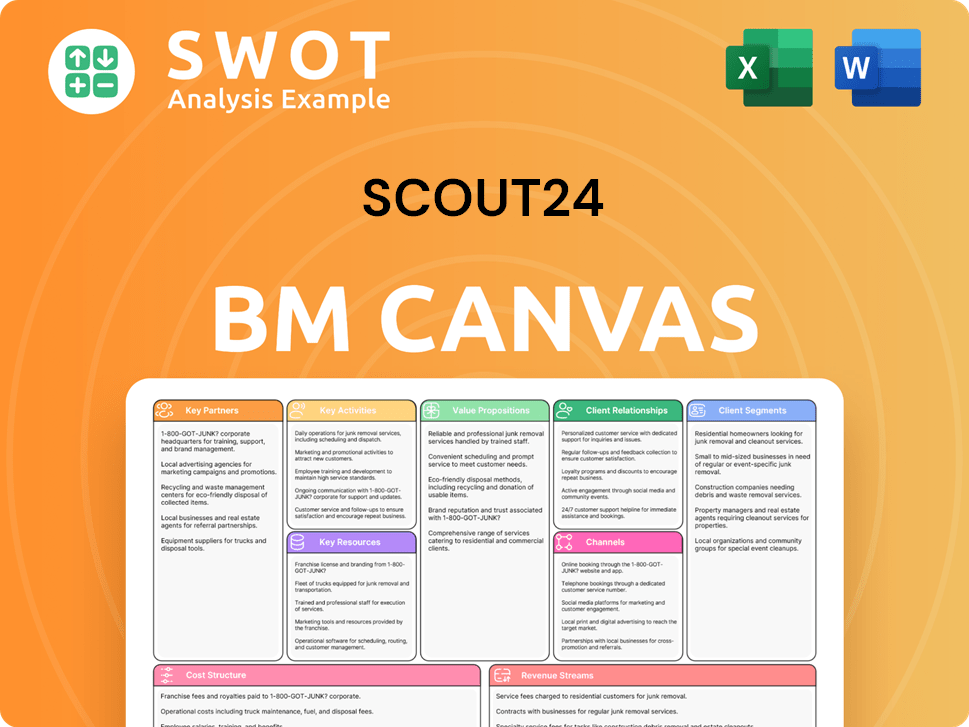
What Recent Changes Have Shaped Scout24’s Ownership Landscape?
In the past few years, Scout24's ownership has been influenced by strategic share buyback programs. These programs reflect a commitment to enhancing shareholder value. On September 25, 2024, a new share buyback program was announced, with a second tranche of EUR 100 million planned to begin no earlier than April 7, 2025, and conclude by June 3, 2026. The first tranche, worth EUR 50 million, completed on April 2, 2025, leading to the acquisition of 569,902 shares, representing 0.8% of the registered share capital. Earlier buyback initiatives included programs of up to EUR 50 million, which ended on August 30, 2024, acquiring 729,896 shares (1.0% of registered share capital), and a program of up to EUR 60 million from March 2023 to January 2024, acquiring 838,361 shares (1.1% of registered share capital).
As of June 6, 2025, a total of 62,429 shares have been repurchased under the program announced in April 2025. This consistent approach to share repurchases demonstrates the company's focus on returning value to its shareholders. These actions are a key part of the company's strategy to manage its capital and optimize its financial structure, which is a crucial element in the context of understanding the current ownership structure of the Scout24 company.
| Share Buyback Program | Amount (EUR Million) | Shares Acquired | Percentage of Registered Share Capital |
|---|---|---|---|
| Announced September 25, 2024 (Tranche 1) | 50 | 569,902 | 0.8% |
| Ended August 30, 2024 | 50 | 729,896 | 1.0% |
| March 2023 - January 2024 | 60 | 838,361 | 1.1% |
A significant change in leadership occurred on March 1, 2025, with Ralf Weitz taking over as Chief Executive Officer (CEO) of Scout24 SE, succeeding Tobias Hartmann. Weitz, who has been with the company since 2008 and served as Chief Product & Technology Officer since 2018, is expected to continue the company's successful strategy. This includes a focus on interconnectivity and artificial intelligence, influencing the future direction and potentially the ownership trends of Scout24.
Ongoing share buyback programs signal management's confidence and commitment to shareholder value. These programs reduce the number of outstanding shares, increasing earnings per share and potentially boosting the stock price.
The appointment of Ralf Weitz as CEO marks a strategic continuation of the company's direction. His background in product and technology suggests a focus on innovation and digital transformation, which can influence investor sentiment and ownership dynamics.
Increased institutional ownership in companies like Scout24 indicates growing investor confidence. This can lead to more stable ownership structures and greater market capitalization. The company's strong market position and data assets contribute to this trend.
A focus on ESG (Environmental, Social, and Governance) factors, such as the 56% CO2e reduction compared to 2018 and approximately 41% women in leadership positions in 2024, is increasingly important to investors. This can attract socially responsible investors and influence ownership patterns.
Scout24 Porter's Five Forces Analysis
- Covers All 5 Competitive Forces in Detail
- Structured for Consultants, Students, and Founders
- 100% Editable in Microsoft Word & Excel
- Instant Digital Download – Use Immediately
- Compatible with Mac & PC – Fully Unlocked
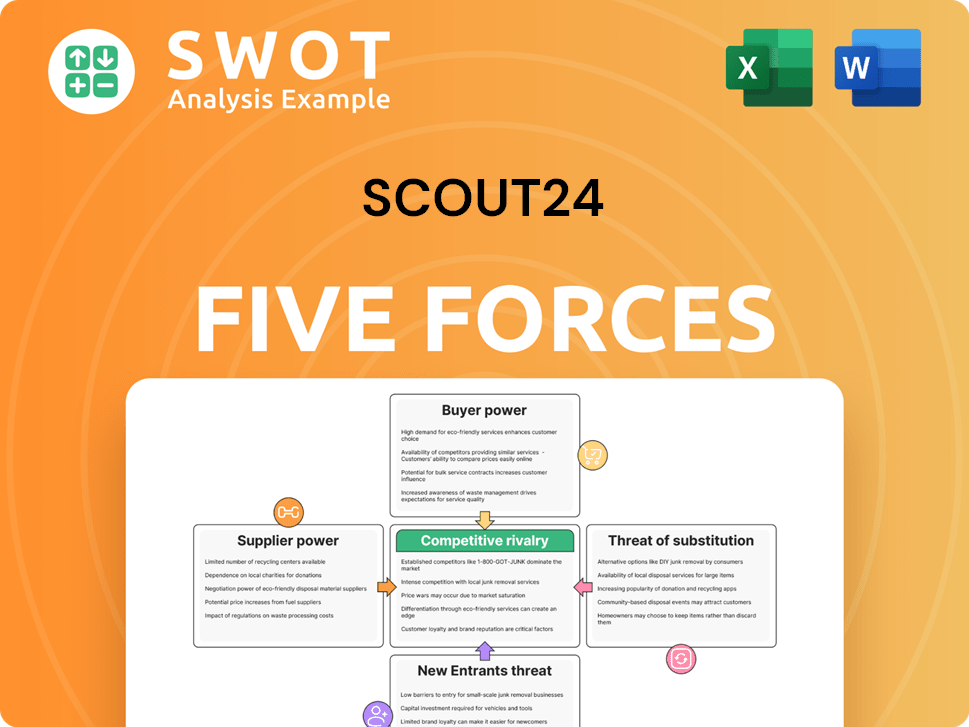
Related Blogs
- What are Mission Vision & Core Values of Scout24 Company?
- What is Competitive Landscape of Scout24 Company?
- What is Growth Strategy and Future Prospects of Scout24 Company?
- How Does Scout24 Company Work?
- What is Sales and Marketing Strategy of Scout24 Company?
- What is Brief History of Scout24 Company?
- What is Customer Demographics and Target Market of Scout24 Company?
Disclaimer
All information, articles, and product details provided on this website are for general informational and educational purposes only. We do not claim any ownership over, nor do we intend to infringe upon, any trademarks, copyrights, logos, brand names, or other intellectual property mentioned or depicted on this site. Such intellectual property remains the property of its respective owners, and any references here are made solely for identification or informational purposes, without implying any affiliation, endorsement, or partnership.
We make no representations or warranties, express or implied, regarding the accuracy, completeness, or suitability of any content or products presented. Nothing on this website should be construed as legal, tax, investment, financial, medical, or other professional advice. In addition, no part of this site—including articles or product references—constitutes a solicitation, recommendation, endorsement, advertisement, or offer to buy or sell any securities, franchises, or other financial instruments, particularly in jurisdictions where such activity would be unlawful.
All content is of a general nature and may not address the specific circumstances of any individual or entity. It is not a substitute for professional advice or services. Any actions you take based on the information provided here are strictly at your own risk. You accept full responsibility for any decisions or outcomes arising from your use of this website and agree to release us from any liability in connection with your use of, or reliance upon, the content or products found herein.